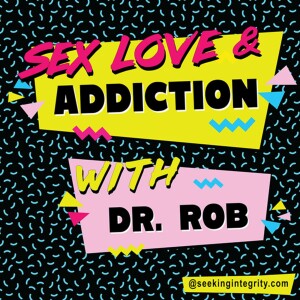
Thursday Nov 21, 2019
Sex, Porn and the Culture Wars: Being An Expert in a Disinformation Era
Rob wanted to take some time to express some of the challenges he is facing in communicating the importance of his work on this week’s episode. Rob recently attended a conference in Australia that was a bit frustrating to experience. Facts matter in the therapy world and it seems that people prefer to listen to the loudest of voices instead of the experts who have dedicated their lives and education to addiction and therapy. Everyone wants you to take a side or to think in absolutes, but therapists don’t take sides. Therapists guide you in choosing what’s right for you.
TAKEAWAYS:
[2:05] We don’t really have all the research about porn addiction yet.
[3:50] Porn can be bad for some people, but it doesn’t mean that it’s bad for everyone.
[4:35] When Rob spoke at a conference in Australia about his neutral beliefs about porn and porn addiction, people were disappointed. When attending scientific conferences, it’s important to present facts; not opinions.
[5:55] Unfortunately, people who are anti-porn hold very strong beliefs about it, but they might not necessarily have the clinical knowledge on how addiction really works. A lot of speakers were not citing statistics or facts in their talks.
[7:45] It’s a catch 22. Anti-porn people do not want to talk about the positives of porn and sexual health professionals don’t want to talk about the negatives of porn and sex addiction. What you need is a balance and you can’t have that if you are very biased towards one belief or the other.
[8:15] Rob makes the connection about how people feel about porn addiction to how people felt about prohibition back in the day. It was deeply rooted in moral, religious beliefs, with conservative overtones.
[9:15] Fear sells. All you have to do is pick a side and think in absolutes, and you will be very popular. Rob doesn’t believe this is the best approach.
[12:55] Rob and some of his fellow colleagues, who hold PhDs on the subject, were turned down to speak because event organizers preferred the speaker who had more media contacts, who were ‘marketable’, or even paid more for a booth. It’s a sad state when fame is preferred over expert knowledge at scientific conferences!
[17:20] How can you do mental health treatment without asking about human sexuality? It sets Rob’s hair on fire when there is such a big disconnect in this area.
[22:05] When you use the word ‘addiction’, you are not shaming yourself. You are embracing your vulnerabilities. You have limits and you learned what they are. That’s a good thing.
[24:55] You can never debate facts to people who have very strong emotional beliefs or opinions. You will always lose.
[26:15] Rob doesn’t understand why the sexual world is so split on certain issues when we all use the same methods and techniques to treat patients. Life would be so much better if we can just come together and work together.
RESOURCES:
The Porn Panic: Is Porn a ‘Public Health Crisis’?
Cruise Control: Understanding Sex Addiction in Gay Men
Prodependence: Moving Beyond Codependency
Rob@sexandrelationshiphealing.com
Prohibition: A Film by Ken Burns and Lynn Novick
QUOTES:
- “I don’t really decide for you or for anyone else whether porn is good or porn is bad because I think I would be a bad therapist.”
- “Believe me, fear sells. I can show you a thousand images from online porn that would make you tell me porn is horrible.”
- “When we’re talking about our pleasures and our human desires, I think it’s always a bad idea to be in black and white.”
- “That’s an anti-expert experience. When the person who shouts the loudest on Twitter or online or on TV gets the most attention, it doesn’t mean they have the most knowledge.”
No comments yet. Be the first to say something!